-
Prayers Heard and Shared
 “Thanks for listening to me. I feel better even for just having talked about it.” This expression of thanks came from a sister with whom I had a lengthy, tearful conversation. She had shared some things that were weighing on her—things affecting her family.
“Thanks for listening to me. I feel better even for just having talked about it.” This expression of thanks came from a sister with whom I had a lengthy, tearful conversation. She had shared some things that were weighing on her—things affecting her family.When we verbalize what we are going through, to God and to others, we alleviate the weight, we minimize the pain, and we lower the level of intensity. Also, when we share the burden of what we are carrying, we remember that we are not alone (Gal. 6:1-2).
When we bottle it all up, we can suffer from what I call “pressure cooker syndrome.” If we keep it all inside, the moment will come when we cannot handle it anymore and we will explode, thus creating a huge mess that we are cleaning up for weeks—all over the kitchen and all throughout our lives.
On the other hand, when we talk about it, in prayer, we release some of the pressure. We remember that we are never alone, and that God always listens. Therefore, prayer is one of the most powerful ways to alleviate stress, express frustration, rejoice, and find peace.
Prayer is one of the opportunities to deepen our intimacy with God. The constant contact and communication with our Creator, Father, and Great Physician are vital for our wellbeing. And when we give everything over to the Great I AM, we keep our eyes fixed on the Whole... not just our part.
In addition, prayer is an opportunity to deepen our relationships with one another. When we pray together, we join as one voice in thankfulness, petition, and intercession. My Iron Rose Sisters encourage me through their prayers for me and for others.
We pray about the ways in which we want to grow or bloom. We pray that God will eliminate the thorns we recognize and that He will reveal the ones we don’t yet see. We give thanks to God for the opportunity to deepen our friendship as iron sharpening iron.
We share burdens in prayer and when we join in prayer, we strengthen the bonds between the different parts of the Whole.
Thank you for being an integral part of the Whole by joining with us in prayer during our Prayer Month!
-
Prayers of Faith
Written by Johanna Zabala, volunteer with Iron Rose Sister Ministries in Ecuador

Rejoice always, pray continually, give thanks in all circumstances; for this is God’s will for you in Christ Jesus. (I Thessalonians 5:16-18 NIV)
It is comforting to live according to what is set out in this passage, since the joy of the Lord is our strength through today's trials.
I believe that constant prayer goes deep within us, living out the desire to be in communication with, and linked to, the Power of God at all times. Then that communication and intimacy with God through prayer becomes a full part of us that truly unites us with Him.
Knowing how to be thankful for everything, whether good or bad, teaches, serves, and helps us to grow in faith, remembering what Romans 8:28 says. “And we know that for those who love God all things work together for good, for those who are called according to his purpose.”
When we see both the will of God and ours, we know they must be intertwined with the Holy Spirit because the Heavenly Father wants to give us the best; and what is best for us is edification, as 1 Corinthians 10:23 says. Living in the will of God builds the character of Christ in each one of us, and that is why it should be a priority to seek His perfect will through absolute communication with the Maker of Life.
I faithfully believe that prayer will bring perfect and essential intimacy with the Heavenly Father, that communication with others will be achieved, and that we will radiate Christ through our faith and dedication as indicated in Galatians 2:20.
I have been crucified with Christ. It is no longer I who live, but Christ who lives in me. And the life I now live in the flesh I live by faith in the Son of God, who loved me and gave himself for me.
Knowing and loving the Lord, and as a follower of Christ, His teachings on prayer are of great inspiration to me. In Luke 22:42 NLT, the Lord Himself says, “Father, if you are willing, please take this cup of suffering away from me. Yet I want your will to be done, not mine.” We see here that although on many occasions our will is different than the will of God, we must seek the Lord’s will every day. In times of tribulation, His will is perfect and we will only understand it and make it a reality when we are in constant communication with Him.
Everything Jesus did to save us certainly was not easy for Him; but His immense love, obedience, and faith led Him to fulfill the will of the Father and not His own as a human.
Another great prayer inspiration for me is Hannah, Samuel's mother, as described in 1 Samuel chapter 1, verses 1-28. Hannah, full of faith in her heart, was constant and very specific in her prayers. She ultimately received her desired answer—having a child—despite her advanced age and sterility, then offered him to the service of God in gratitude for the favor granted.
On this earth, through the Holy Spirit that unites us, many brothers and sisters in Christ Jesus teach us to be unwavering servants of faith through prayers to God.
Today, I remember, with great admiration and respect, Sister Carmen Franco, a reverent, faithful, and fervent woman of prayer. Sister Carmen grew up in a Christian home, describing her life as one full of great battles. Even so, she obtained material blessings, but more importantly, spiritual blessings.
One day in 2017, as she was praying about her need to meet with the Lord's church but not knowing where to go, some members of the Church of Christ La Mesa de Los Indios, in Mérida, Venezuela, knocked on her door and invited her to their worship service. She accepted their invitation. When she attended, she arrived with a heart full of gratitude because her prayers had been answered.
Beloved Sister Carmen never stopped meeting with the congregation. Even during the pandemic, she continued to attend. She would say, “God with us, nothing against us.” She was vigilant, following Covid guidelines when attending all gatherings. Her valuable example is inspirational because she was praying each time we visited her. She taught us to strengthen, as a Christian family, the need for prayer as a means of daily communication with the Lord, through every circumstance.She always prayed for everything and everyone. Without a doubt, Sister Carmen Franco inspired us with her commitment to prayer.
Although her living conditions were sparce, she was constantly grateful and shared what the Lord gave her. Hers was a house of prayer; she lifted everything to the Father.
Sister Carmen went to be with the Lord on December 31, 2021, praying and praising the King of Kings, who answered her prayers for a peaceful end.
Dear sisters, let us be women of prayer with hearts full of faith. Will we be willing to pray without ceasing?
-
Prophecy and Fulfillment
 Written by Deanna Brooks, volunteer with Iron Rose Sister Ministries in Arkansas
Written by Deanna Brooks, volunteer with Iron Rose Sister Ministries in ArkansasDecember… it’s the time of year when people around the world turn their thoughts to a small village in what is now the nation of Israel. While Scripture never tells us when Jesus was born, we take this opportunity to share His complete story with the world. Jesus, the Christ… the promised Messiah… is much more than the Baby born in Bethlehem. He is our Savior, the One sent to redeem us from the evils of Satan.
In this lesson you will find groups of scriptures after a statement about the Messiah. Those from the Old Testament will be prophecy, and the New Testament scriptures that follow are fulfillment of those prophecies.
Before the foundation of the earth, Paul tells us that God set this plan into place, that a Redeemer would come to restore the relationship that was broken by Satan in the Garden of Eden (Eph. 1:4.) There are over 300 Old Testament prophecies for the coming Messiah. In the New Testament we read how Jesus, born in Bethlehem, raised in Nazareth, was the fulfillment of those many years of prophecies.
The first set of prophecies and fulfillment are about the birth of our Lord. Early in Scripture we read of the promised Messiah and His birth:
Blessings would come through Abraham.
“Now the LORD said to Abram, “Go from your country and your kindred and your father's house to the land that I will show you. And I will make of you a great nation, and I will bless you and make your name great, so that you will be a blessing.” (Genesis 12:1-2)
“And all the prophets who have spoken, from Samuel and those who came after him, also proclaimed these days. You are the sons of the prophets and of the covenant that God made with your fathers, saying to Abraham, and in your offspring shall all the families of the earth be blessed.”(Acts 3:24-25)
“And the Scripture, foreseeing that God would justify the Gentiles by faith, preached the gospel beforehand to Abraham, saying, “In you shall all the nations be blessed.””(Galatians 3:8)
A virgin would have a son.
“Therefore the Lord himself will give you a sign. Behold, the virgin shall conceive and bear a son, and shall call his name Immanuel.” (Isaiah 7:14)
“And Mary said to the angel, “How will this be, since I am a virgin?””(Luke 1:34)
This promised Child would be born in Bethlehem.
“But you, O Bethlehem Ephrathah, who are too little to be among the clans of Judah, from you shall come forth for me one who is to be ruler in Israel, whose coming forth is from of old, from ancient days.” (Micah 5:2)
“When Herod the king heard this, he was troubled, and all Jerusalem with him; and assembling all the chief priests and scribes of the people, he inquired of them where the Christ was to be born. They told him, “In Bethlehem of Judea, for so it is written by the prophet: “‘And you, O Bethlehem, in the land of Judah, are by no means least among the rulers of Judah; for from you shall come a ruler who will shepherd my people Israel.’” (Matthew 2:3-6)
The ministry of the promised Messiah would be special, different from Old Testament prophets:
The Messiah would have a forerunner.
“A voice cries: “In the wilderness prepare the way of the LORD; make straight in the desert a highway for our God.”” (Isaiah 40:3)
“He said, “I am the voice of one crying out in the wilderness, ‘Make straight the way of the Lord,’ as the prophet Isaiah said.””(John 1:23)
“This is he of whom it is written, “‘Behold, I send my messenger before your face, who will prepare your way before you.’ Truly, I say to you, among those born of women there has arisen no one greater than John the Baptist….””(Matthew 11:10-11)
The Messiah would have a miraculous ministry.
“Then the eyes of the blind shall be opened, and the ears of the deaf unstopped; then shall the lame man leap like a deer, and the tongue of the mute sing for joy…” (Isaiah 35:5-6)
“And Jesus answered them, “Go and tell John what you hear and see: the blind receive their sight and the lame walk, lepers are cleansed and the deaf hear, and the dead are raised up, and the poor have good news preached to them.”(Matthew 11:4-5)
“Now Jesus did many other signs in the presence of the disciples, which are not written in this book; but these are written so that you may believe that Jesus is the Christ, the Son of God, and that by believing you may have life in his name.” (John 20:30-31)
The Messiah would be despised and rejected.
“He was despised and rejected by men, a man of sorrows, and acquainted with grief; and as one from whom men hide their faces he was despised, and we esteemed him not.” (Isaiah 53:3)
“When they heard these things, all in the synagogue were filled with wrath. And they rose up and drove him out of the town and brought him to the brow of the hill on which their town was built, so that they could throw him down the cliff.” (Luke 4:28-29)
“So they picked up stones to throw at him, but Jesus hid himself and went out of the temple.” (John 8:59)
The life of this Messiah would end with death and resurrection:
They would cast lots for His clothing.
“they divide my garments among them, and for my clothing they cast lots.” (Psalm 22:18)
“When the soldiers had crucified Jesus, they took his garments and divided them into four parts, one part for each soldier; also his tunic. But the tunic was seamless, woven in one piece from top to bottom, so they said to one another, “Let us not tear it, but cast lots for it to see whose it shall be.” This was to fulfill the Scripture which says, “They divided my garments among them, and for my clothing they cast lots.””(John 19:23-24)
His hands and feet would be pierced.
“…they have pierced my hands and feet.”(Psalm 22:16b)
“So the other disciples told him, “We have seen the Lord.” But he said to them, “Unless I see in his hands the mark of the nails, and place my finger into the mark of the nails, and place my hand into his side, I will never believe.””(John 20:25)
“See my hands and my feet, that it is I myself.”(Luke 24:39a)
None of His bones would be broken.
“He keeps all his bones; not one of them is broken.”(Psalm 34:20)
“But when they came to Jesus and saw that he was already dead, they did not break his legs.”(John 19:33)
The Messiah would not remain in the grave.
“For you will not abandon my soul to Sheol, or let your holy one see corruption.” (Psalm 16:10)
“And as they were frightened and bowed their faces to the ground, the men said to them, “Why do you seek the living among the dead? He is not here, but has risen. Remember how he told you, while he was still in Galilee, that the Son of Man must be delivered into the hands of sinful men and be crucified and on the third day rise.””(Luke 24:5-7)
The story of Jesus our Redeemer shows the marvelous love that that our Heavenly Father has for us.
Our Savior is not just the Baby born in Bethlehem. He said, “I am the way, and the truth, and the life. No one comes to the Father except through me” (John 14:6),and He has gone to prepare a place for us. (John 14:1-3)
We give thanks for our promised Messiah, the fulfillment of prophecy and our Way to the Father.
[All scriptures are ESV]
-
Relationships through which I have taught or learned
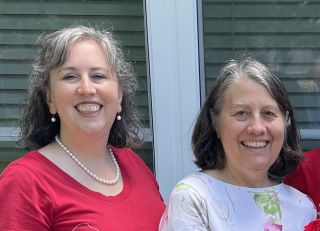 Written by Michelle J. Goff, with her mom, Jocelynn Goff
Written by Michelle J. Goff, with her mom, Jocelynn GoffThe oldest daughter of a college professor and elementary teacher, my mom grew up learning through at least two different styles of teaching. Not all teaching was formally imparted, of course. My mom never took a speech class from Dr. Brown at Miami-Dade Community College. She never sat in her mom’s classroom during regular school hours, but she did spend time there after school while her mom prepared for the next day’s instruction.
It is no surprise that my mom became a teacher herself. She is a natural teacher and gifted storyteller. Her students would sit up straighter when she offered a “lagniappe story.” Lagniappe is French for “a little something extra,” which meant that this story would not be on the test!
In contrast, when my granddad would pepper us granddaughters with Bible trivia questions during our Christmas visits, he emphasized those of greater importance by saying, “This one will be on the final exam.” What I most learned from those “tests” was his love for Bible study and his diligent commitment to finding little-known jewels in Scripture.
Years later, our conversations have been more give-and-take. I have shared biblical nuggets of truth that I’ve discovered with a similar passion to share it with others. Similarly, my mom and I have transitioned from being exclusively mother and daughter to being Christian sisters and partners in the gospel. The teaching and learning matured and became more mutual.
As you know, our teaching and learning does not come exclusively through teachers, nor through our families. Prayerfully, we seek to be surrounded by others who will invest in us, as well as those with whom we can build relationship. Pivotal teachers can transform our relationship with a certain subject matter… inspiring us to persevere or give up. Close friends teach us what it means to laugh, as we also learn what it means to forgive. Neighbors teach us kindness as we learn how to be a good neighbor ourselves.
There are also those who teach through their words and actions, unaware of how many are watching, learning from their example. This is especially true of our Christian walks. We must be careful to practice what we preach, and we cannot teach what we have not yet effectively learned.
When I asked my mom about a relationship through which she has taught or learned, A.R. Kepple was the first person that came to mind. His simple teaching was a seed planted and watered, week after week. They met at the Downtown Church of Christ in Kansas City, Missouri, the new congregation her parents helped establish in the early 1960’s.
After teaching the children for 20-30 minutes on Sunday evenings, Brother Kepple would invite 7-year-old Jocelynn to join him on the front row during the songs and sermon. After reminding her to mind her manners, her parents granted permission to sit with this retired preacher in his late 70’s.
Once settled with her feet not quite touching the floor, while waiting for the singing to start, Brother Kepple would open his Bible to Matthew 5 and read, “You are the salt of the earth. You are the light of the world,” pointing to each sentence as he read them.
“He told me that every time I sat with him, and it made an impression on me and planted a seed in my mind and heart and spirit,” Mom recalled. He lived out the teaching he repeated.
Who is someone through whom you have learned what it means to be a Christian? What has it looked like for you to teach others what it means to follow Christ?
-
Relationships through which I have taught or learned
Written by Michelle J. Goff, with her mom, Jocelynn Goff
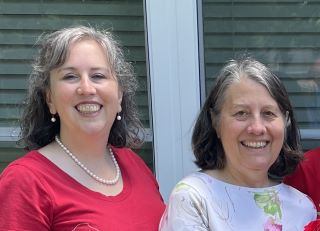
The oldest daughter of a college professor and elementary teacher, my mom grew up learning through at least two different styles of teaching. Not all teaching was formally imparted, of course. My mom never took a speech class from Dr. Brown at Miami-Dade Community College. She never sat in her mom’s classroom during regular school hours, but she did spend time there after school while her mom prepared for the next day’s instruction.
It is no surprise that my mom became a teacher herself. She is a natural teacher and gifted storyteller. Her students would sit up straighter when she offered a “lagniappe story.” Lagniappe is French for “a little something extra,” which meant that this story would not be on the test!
In contrast, when my granddad would pepper us granddaughters with Bible trivia questions during our Christmas visits, he emphasized those of greater importance by saying, “This one will be on the final exam.” What I most learned from those “tests” was his love for Bible study and his diligent commitment to finding little-known jewels in Scripture.
Years later, our conversations have been more give-and-take. I have shared biblical nuggets of truth that I’ve discovered with a similar passion to share it with others. Similarly, my mom and I have transitioned from being exclusively mother and daughter to being Christian sisters and partners in the gospel. The teaching and learning matured and became more mutual.
As you know, our teaching and learning does not come exclusively through teachers, nor through our families. Prayerfully, we seek to be surrounded by others who will invest in us, as well as those with whom we can build relationship. Pivotal teachers can transform our relationship with a certain subject matter… inspiring us to persevere or give up. Close friends teach us what it means to laugh, as we also learn what it means to forgive. Neighbors teach us kindness as we learn how to be a good neighbor ourselves.
There are also those who teach through their words and actions, unaware of how many are watching, learning from their example. This is especially true of our Christian walks. We must be careful to practice what we preach, and we cannot teach what we have not yet effectively learned.
When I asked my mom about a relationship through which she has taught or learned, A.R. Kepple was the first person that came to mind. His simple teaching was a seed planted and watered, week after week. They met at the Downtown Church of Christ in Kansas City, Missouri, the new congregation her parents helped establish in the early 1960’s.
After teaching the children for 20-30 minutes on Sunday evenings, Brother Kepple would invite 7-year-old Jocelynn to join him on the front row during the songs and sermon. After reminding her to mind her manners, her parents granted permission to sit with this retired preacher in his late 70’s.
Once settled with her feet not quite touching the floor, while waiting for the singing to start, Brother Kepple would open his Bible to Matthew 5 and read, “You are the salt of the earth. You are the light of the world,” pointing to each sentence as he read them.
“He told me that every time I sat with him, and it made an impression on me and planted a seed in my mind and heart and spirit,” Mom recalled. He lived out the teaching he repeated.
Who is someone through whom you have learned what it means to be a Christian? What has it looked like for you to teach others what it means to follow Christ?
-
Remembering Christ as the Head during Difficult Times
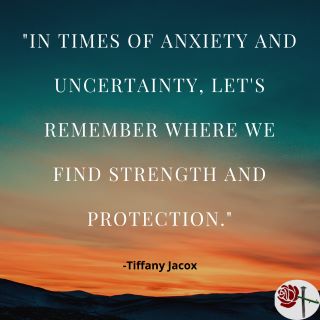 Written by Tiffany Jacox, volunteer with Iron Rose Sister Ministries in Bellevue, Nebraska
Written by Tiffany Jacox, volunteer with Iron Rose Sister Ministries in Bellevue, NebraskaSitting here looking out the window, it is a sunny day but the wind is blowing hard and the temperatures are cold. We are experiencing the Corona Virus all around the world and people everywhere are being quarantined. People are fighting the illness; people are losing jobs, losing vacations and fun plans, and losing loved ones. It is a time of great uncertainty and anxiety, but we must remember where our strength and protection come from.
He is the image of the invisible God, the firstborn of all creation (Col 1:15). Jesus is the image of God! He was first. Firstborn of all creation. He is before all things, and in Him all things hold together (Col 1:17). Jesus is our glue! He is our strength (Phil 4:13), He is our peace (Phil 4:7), He is our joy (Luke 2:10), and He is our refuge (Ps 46:1, 9:9). We can go to Him in prayer and we can trust in Him (Prov 3:5) during our moments of troubles and weakness. We can even find joy in our weakness because as we endure these hardships and difficulties, we become strong because of the strength He gives us. Enduring refines us, it strengthens us, and it grows us as we lean into God more. As we lean into Jesus and He holds us together, we can then reach out to others.
Christ is the head of the body, the church; and He is the beginning (Col 1:18). We know He is the head and we, the members, are various (important and needed) body parts. I would also like to focus on Christ as the head of our lives. He is our example, “just as the Son of Man did not come to be served, but to serve, and to give His life a ransom for many” (Matt 20:28). Jesus served. We see examples through the Bible of Jesus serving, healing, listening, and loving many. We are His chosen people, as 1 Peter 2:9 states. He has called us out of darkness. He has called us to a purpose greater than ourselves. He is always with us, and as He states in John 14:18, “I will not leave you comfortless; I will come to you.” He is the head; He came to love and serve us and called us out to do the same.
How can we make that applicable today? Christ is the head. He is the bridegroom of the church. He loves us and never forsakes us (Deut 31:6,8). He, in His love, cares for us and He is our example. We can rest in Him and His promises. We can remain secure in our eternal salvation through the death, burial, and resurrection of Jesus Christ. And if we can stand strong on our Jesus foundation, then can’t we spread that love and security to others? Jesus is the head and we are the rest of the body (1 Cor 12:12). So, come on arms, legs, hands and feet! Let’s get to work! Let’s love and serve like Jesus did. We can provide hope in a time of uncertainty, we can provide light in a time of darkness, and we can provide comfort in a time of grief. God equips us to do these good works (Eph 2:10). Rejoicing in hope, persevering in tribulation, and being devoted to prayer (Rom 12:12). Just as Christ did.
-
Seeing is Believing from the I AM’s Perspective
 (taken from I already AM: Testimonies of Belief in the Great I AM, chapter 1)
(taken from I already AM: Testimonies of Belief in the Great I AM, chapter 1)
The illustration is made of five blind Chinese men who were asked to describe an elephant.
The first man stepped up to the elephant, felt with his hands, smelled with his nose and said, “It is long and narrow, very flexible, like a snake, but with a little brush on the end. It is also very stinky.”
“Long and narrow?” responded the second man. “It is more like a thick hose that, ay! Sprays out the end!”
“It is no hose at all,” said the third man, the shortest of the five. “It is most like a tree, rough and solid. Much thicker than a hose.”
“If my friend declared it a tree,” interjected the fourth man. “I most definitely have the biggest leaf I have ever encountered. It is thin and waves in the wind.”
“No. You all have it wrong. It is broad and wide, like a wall,” concluded the fifth man.
Which man was correct? And which man was wrong?
How does God see the elephant?
How are we like the blind men?
Only God has the clear perspective of the big picture. Only God is able to address the whole elephant. What we are dealing with... our questions in life... They are barely a wrinkle on the elephant’s knee.
Reflection: Am I trusting the I AM with the whole elephant?
We will be looking through the lens of the I AM because it matters not what the world says, but rather what the Word says.
And when I keep my eyes fixed on the I AM, when I strive to see things from His perspective, I avoid the trap of the futile searches for answers, identity, purpose, provision, or whatever else I am seeking. Because everything else falls short of the I AM. -
Sharing and Forgiving Difficulties
Written by Johanna Zabala, volunteer with Iron Rose Sister Ministries in Ecuador
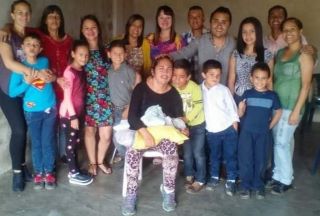
The beautiful biblical passage in Galatians 6:2 encourages me to continue fulfilling the Christian mission of bearing the burdens of my sisters in Christ, my family, and others with whom I have relationships. Based in the love of Christ, this scripture is an exhortation of obedience, bonding, communication, and fellowship with each other.
When I say "burdens," I mean the various difficulties and adversities that as human beings and followers of Christ we will encounter in each stage of life, both physical and spiritual.
Over time, we may realize that some burdens began in our childhood. This affirms the great importance of a healthy childhood, starting as early as conception. Early childhood is the foundation of our adult lives. All along the way, we are soul, body, and heart, made with love and an existential purpose.
When thinking of ourselves as a soul, we have a spirit of life that we do not see, which makes it challenging for us to care for and understand. We dedicate a little more care to the physical or external body. However, we take only minimal care of our internal organs. We also have feelings, which flow from the human heart. The word of God says that they are deceitful, as Proverbs 4:23 tells us. We must keep our hearts pure in accordance with Matthew 5:8.
These three areas of life need to be attended to and cared for equally to achieve the first of the greatest commandment of the Lord Jesus. Faced with this need, structuring soul, body, and heart to achieve their complete harmony will present certain challenges or difficulties toward the harmony between the three. Therefore, it will take experience, acceptance, strength, and above all, a lot of wisdom and love to overcome this challenge.
Overcoming the difficulties to achieve this harmony requires walking together through each experience, obstacle, and blessing. We can turn this process into an opportunity, rather than a burden, to understand the reason for the way we interact with our peers. In interpersonal relationships, we can choose to understand, see, and recognize in others our own weaknesses and strengths, which will allow us to be better people.
Furthermore, Matthew 11:28-30 teaches that we can all go into Jesus’ presence. In Him, we learn and rest. We are invited to bear the yoke of Christ and to learn of His meekness and humble heart. The purpose is to find rest for our souls through full dependence on the Lord. Jesus helps me to observe my surroundings daily and share important challenges and sufferings with my physical and spiritual family. These are clusters of constant personal and spiritual growth.
By working with, getting involved with, and getting to know each member of the Church, we reflect the great need we have to help, build up, and love one another, as Jesus Christ Himself taught.
The Lord Jesus calls us to salvation but also invites us to heal the soul. Heal! From what? It may be from an unsuccessful way of living taught by our earthly parents, from which are called to be purified and transformed, as we read in 1 Peter 1:18.
As someone once said, “We see faces; we do not know hearts.” The prophet Isaiah, in chapter 1 and verse 5, emphasizes that "Your whole head is injured, your whole heart afflicted"(NIV). This reminds us that, despite having been born again in the waters of baptism for a new life, there may still be situations that have occurred but not yet been consciously healed.
I know adults with significant wounds from their childhood who still show significant gaps in their relationships. One study states that approximately 89% of people with voids in their relationships were abandoned by a parent. Therefore, within the home and the church it is urgent to help understand the importance of forgiving our earthly parents for:
1. Being completely absent
2. Being very harsh in parenting
3. Not exercising authority or not being there, especially in the early stages of childhood
4. Being unloving
5. Not paying attention
6. Demonstrating immaturity
Sadly, those who suffer emptiness in interpersonal relationships agree that the wounds they feel result from not having grown up with a strong family nucleus. This results in difficulties raising their own children and even more so, an inability to assert themselves in communication with parents, spouses, colleagues, friends, and even with our Heavenly Father.
In conclusion, as daughters, let us wholeheartedly forgive the inexperience and the hurts caused by parents or caregivers as soon as possible in order to be healed. And, if we have children, let’s not hurt them. A commitment like this requires constant prayer and wisdom in the love of Christ. Let’s help each other in sharing and forgiving.
-
Singleness
Written by a volunteer with Iron Rose Sister Ministries in the USA

Singleness: quality or state of being single, unmarried.
This is recent for me. I was married for many years to a warrior for the Lord and lost him to COVID 18 months ago. It feels so strange to try and accept this: I am single.
Paul considers his singleness as a gift from God. In 1 Corinthians 7, he discusses marriage and sex and singleness in verses 1 and 2 (ESV), “It is good for a man not to have sexual relations with a woman. But because of the temptation to sexual immorality, each man should have his own wife and each woman her own husband.”
A few verses later in verses 6-9 (NIV) Paul says,
I say this as a concession, not as a command. I wish that all of you were as I am. But each of you has your own gift from God; one has this gift, another has that. Now to the unmarried and the widows I say: It is good for them to stay unmarried, as I do. But if they cannot control themselves, they should marry, for it is better to marry than to burn with passion.
Why would Paul see singleness as a gift? He explains it in verses 32-34, “I want you to be free from anxieties...” Being single gives us the ability to serve the Lord anywhere in the world, without having to consider whether our mate is also desirous of going to live where we feel called to. We are focused on serving God alone.
But in the beginning, in Genesis 2:18, God said, “It is not good for the man to be alone.” Paul thinks singleness is good so we can fully focus on serving God. But God knew it was not good for everyone.
I asked a good friend to share with me his thoughts on singleness. He was also married for a long time and has now been single longer than I have. He said, “It’s unnatural and it hurts.”
I agree.
God made us male and female for a reason; not just for procreation. Yes, that is a very important reason, to keep mankind alive and growing on this earth, but there is so much more to marriage than having children. After raising my children to adulthood and continuing to have the wonderful gift of marriage for many years, I long to have that relationship again; to have the daily love and support, camaraderie, laughter, physical touch, and just the joint shouldering of the burdens of everyday life together with a mate.
At this moment, a large part of me feels destroyed and empty, like a cherished old home that has been burned out and abandoned. But feelings aren’t facts. I know that I am not abandoned. My Father is always here with me, every minute of every day. When I lost my husband, my Dad in heaven gifted me with a tribe of godly friends who welcomed me (Rom. 15:7), loved me (Rom. 12:10), and encouraged me (Prov. 27:9).My tribe bore my weakness with me(Rom. 15:1-3).
God has also comforted me in surprising ways, like putting it on my heart to make a list of the burdens my husband doesn’t carry anymore. I read this list often and imagine how happy he is in paradise now (Rev. 21:4).
My Father reminds me how very fleeting life on earth in James 4:14b, “What is your life? For you are a mist that appears for a little time and then vanishes.” Compared to eternity, our lives here on earth are very short indeed. But they don’t feel short, especially when we are hurting.
I don’t know why God chose to take my husband home, nor how long I will have on this earth yet to live. Right now, the loneliness each night is like a black hole, threatening to swallow me entirely. It feels unnatural to be alone. And it hurts. So, I turn to my “Father of mercies and God of all comfort, who comforts us in all our affliction…” (2 Cor. 1:3-4 ESV).
I am still here. I don’t know why, but while I am, I will serve God, and follow His Word the best I can. So, I study about widowhood, “A wife is bound to her husband as long as he lives. But if her husband dies, she is free to be married to whom she wishes, only in the Lord” (1 Cor. 7:39).
Singleness and I are not friends. I have begun praying that God will grant me a godly man that I can love, and who will love me—someone to hold hands with as we cross the finish line of life together. For now, I can rest in Him as I wait, reminding myself of this passage often, “Be still and know that I am God” (Ps. 46:10).
My Dad in heaven is infinitely better than any earthly father at screening my dates, because He can see into their minds and hearts and knows their intentions. I am confident He will bring me just the right man if I move out of the driver’s seat (which is, frankly, difficult for me!), and instead allow Him to lead.
Singleness can be a great blessing for some. But it is not for everyone. The most important thing in this life is loving and serving our Creator with all our hearts and minds and souls and strength, whether single or married. And one day we can rejoice as we discuss these events together in heaven!
-
Teaching and Learning through Relationships
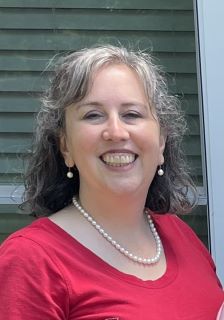 Written by Michelle J. Goff, Founder and Director of Iron Rose Sister Ministries
Written by Michelle J. Goff, Founder and Director of Iron Rose Sister MinistriesIn Matthew 28, we hear the final words of Jesus before His ascension. Verse 18 reminds us that all authority in heaven and on earth has been given to Him.
19 Therefore go and make disciples of all nations, baptizing them in the name of the Father and of the Son and of the Holy Spirit, 20 and teaching them to obey everything I have commanded you. And surely I am with you always, to the very end of the age. (Matt. 28:19-20)
“Go” and “make disciples” are the two commands of ultimate importance as Jesus’ final instructions. The two ways in which we fulfill the command to make disciples are baptizing them and teaching them. Then finally, we hear the promise that Jesus will continue to be with us. Amen!
These facets of the Great Commission are integrally connected to the Greatest Command: to love God and love others. Can we truly make disciples outside of relationship with God or others? The teaching would be limited to lists of instructions or rote information without relationship. “Teaching them to obey” is different than “telling them what to obey.”
I cannot properly teach someone how to make an arepa without first introducing them to this Venezuelan staple. I could tell them what to make, even provide detailed directions, but both of our levels of frustration will be high if I cannot demonstrate how to make it. Subsequently, if my pupil felt defeated and her arepas didn’t turn out well, she will be less likely to make them again on her own.
Conversely, if I explain how to make arepas, step by step, standing by her side and illustrating with my own dirty hands how to prepare the masa and form the arepas, when to flip them, and when they were ready to eat, my student will feel better equipped to continue in the process. Then, we sit down and continue our time together by eating and deepening our friendship, a memory is made, and a connection is built.
The next time my student friend wants to make arepas, she has been set up for success and, if she has a problem, she knows exactly who she can call! We even celebrate together when she sends me a picture of her family eating her imperfectly formed arepas. She is practicing and developing her skills. And she is not alone. Her growing confidence in how to follow the instructions has been encouraged by her teacher. They delight in sharing a good meal and both are inspired to do it again.
The teaching and the learning happened in relationship.
Iron Rose Sister Ministries’ vision is to equip women to connect to God and one another more deeply. The founding principles of that vision and our 2023 theme draw from the Greatest Command (Mark 12:30-31) and the Great Commission (Matt. 28:18-20), inspired by the imagery of Jesus as the True Vine and us as the branches called to bear fruit (John 15). We cannot fulfill any of those commands without relationship! Through the blog posts, virtual events, and other resources, we will emphasize the relational aspects of these three biblical texts: “Teaching and Learning through Relationships.”
First and foremost, our relationship with God is foundational.
4 Remain in me, as I also remain in you. No branch can bear fruit by itself; it must remain in the vine. Neither can you bear fruit unless you remain in me. 5 “I am the vine; you are the branches. If you remain in me and I in you, you will bear much fruit; apart from me you can do nothing. (John 15:4-5)
Secondly, the “much fruit” of our relationship with God will be more disciples, which brings us back to the Matthew 28 text. I love how God ties it all together and brings it full circle!
Thirdly, the ongoing relationships with God and with one another are reiterated throughout the remainder of the New Testament.Luke’s narration of the early church, Paul’s letters, Peter’s reminders, as well as John’s and James’ instructions all provide affirmation of the important of relationship.
If you are not familiar with these scriptures or have not known the blessing of these relationships, we invite you to connect with these promises and commands. Ladies, we especially want to illustrate these foundational truths in the ways God has called us to teach and learn through relationships.
This year, we will follow the same pattern established in 2022 for our blog posts. Tuesdays will describe teaching and learning through relationship(s) in the Bible. Thursdays will illustrate a similar relationship dynamic from one of our stories. Bible stories and God stories… there is so much to teach and to learn!
Thank you for joining us! We will continue to introduce the topic through Jesus’ own example in January. Then, February, our well-established prayer month, will continue the Bible stories and God stories, especially in our relationships and communication with God.
-
The Living God of Abraham, Isaac, and Jacob
Written by Elina Vath, Virtual Assistant for Iron Rose Sister Ministries in Ohio

Each week across city, region, country, and hemisphere, we commemorate together the death and resurrection of our Lord and Savior, Jesus Christ, through the Lord’s Supper. Redemption and salvation through Jesus were foretold in the garden of Eden, fulfilled in Jerusalem, and will continue until He returns.
Before His death, Jesus entered Jerusalem as King, just as the prophet Zechariah said He would. And although it was the last week of Jesus’ human life, He did not receive any relief from those who were determined to see Him fail. Time after time, Jesus looked straight into the hearts of the teachers of the law and completely annihilated their arguments. In a single day, Jesus sent the Pharisees, Herodians, and Sadducees home with their tails between their legs.
Chapter 22 of Matthew’s account of Jesus’ life tells us that the Sadducees attempted to trap Him with a question meant to disprove the resurrection. Jesus knew the scheming intention behind the Sadducees’ question for exactly what it was: a weak attempt to show His ignorance of Moses’ teachings, as if Jesus Himself hadn’t been there when Moses floated in a basket on the Nile, murdered the Egyptian, met his wife, removed his sandals, spread his arms over the Red Sea, and breathed his last.
I picture Jesus shaking His head, sighing a heavy sigh, and then effectively bulldozing the Sadducees' trap with these words, “You are wrong, because you know neither the Scriptures nor the power of God” (Matt. 22:29 ESV). No signs of intimidation or hesitation; rather, Jesus spoke with authority. “You are WRONG,” He told the richest, most powerful Jews of the time. But Jesus didn’t stop there. He then accused the Sadducees of not having done their homework, bringing the conversation to a full stop.
And as for the resurrection of the dead, have you not read what was said to you by God: ‘I am the God of Abraham, and the God of Isaac, and the God of Jacob’? He is not God of the dead, but of the living.(Matt. 22:31-32)
You see, Jesus knew Moses personally. And when God said to Moses in the book of Exodus, “I am the God of Abraham, Isaac, and Jacob,” Jesus watched as Moses was overcome by the sheer power of those words. Matthew tells us that Jesus’ wisdom and power in repeating these words had the same impact on the Sadducees and everyone who heard Him speak—they were all astonished.
Everything about God is alive. His words are alive, His Spirit is alive, His Son is alive, His kingdom is alive, and we are part of this living kingdom. Abraham, who looked at the stars in the night sky, as God made a promise, is alive. Isaac, the one through whom God began fulfilling that promise, is alive. Jacob, the forefather of Moses and someone used by God to preserve Jesus’ bloodline, is alive. Those who have gone before us are alive. Generation to generation, here we stand today, thousands of years later, as followers of the God of (the living) Abraham, Isaac, and Jacob.
Because of Jesus, who is the Life, you and I are counted among the stars in heaven. Generation upon generation of God’s people will live even after our bodies die.
May we all rejoice together at the history of our faith family, and that our names are written in the heavens as part of a promise that continues to be fulfilled.
-
The Precious Great Small Part
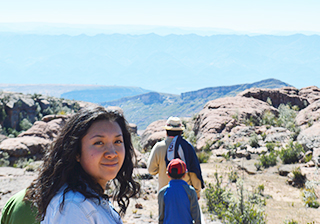 Written by Rosa Perez, volunteer for Iron Rose Sister Ministries in Little Rock, AR.
Written by Rosa Perez, volunteer for Iron Rose Sister Ministries in Little Rock, AR.As human beings, we have been created to connect with each other. Our existence pretty much depends on the relationship we make with one another. We can’t live isolated, otherwise, we could die. Therefore, we become part of something bigger than ourselves. We become part of a group in which we usually contribute. We become participants since we have gifts or abilities to offer. In our society, some of the groups that we know are schools, universities, and private or public businesses. Sadly, our society has composed these groups in a different way where people’s gifts are divided differently than what Jesus has taught us. We have divided people’s roles in levels of importance. Some roles are placed higher than others. For example, the role of the CEO is more important than the guard that opens and closes the door of the company. In our society, we don’t honor the small parts that people give humbly, but instead we diminish them and ignore them. Sometimes we diminish the small parts that people have in the church.
“For by the grace given me I say to every one of you: Do not think of yourself more highly than you ought, but rather think of yourself with sober judgment, in accordance with the faith God has distributed to each of you. For just as each of us has one body with many members, and these members do not all have the same function.” (Romans 12:3-4)
The body of Christ, that is, the Church, has many members with different functions, since we have different gifts. Each gift is a blessing from God. We haven’t done anything to receive those gifts. In the same way, we shouldn’t brag about them or belittle others’ gifts.
“We have different gifts, according to the grace given to each of us.” (Romans 6:12a)
We have an example in the gospel of Mark where a woman poured precious perfume over Jesus’s head. She, being a woman from a small town, gave costly perfume to Jesus. “She did what she could. She poured perfume on my body beforehand to prepare for my burial” (Mark 14:8). What she did was essential and very important. She was part of something really big. She contributed for the precious sacrifice that Jesus made for the entire world.
Like the woman that gave a small part for something really big, we also have small parts for something bigger than ourselves. That is what Jesus taught us when he talked about the Kingdom of God in Matthew 13: “Though it is the smallest of all seeds, yet when it grows, it is the largest of garden plants and becomes a tree, so that the birds come and perch in its branches” (Matthew 13:32). From such a tiny seed, a huge tree grows so that even the birds can stand on it.
Small parts are important and can have great functions that sometimes we don’t realize. Consider the example James gives us, “Or take ships as an example. Although they are so large and are driven by strong winds, they are steered by a very small rudder wherever the pilot wants to go” (James 3:4).
We come to be part of something bigger than ourselves, and that is the Body of Christ. “Now you are the body of Christ, and each one of you is a part of it” (1 Corinthians 12:27). Each member of His Body, even the smallest ones, become part of his precious Body.
“So in Christ we, though many, form one body, and each member belongs to all the others.” (Romans 12:5)
-
Twice-blessed Adoption
Written by Michelle J. Goff, Founder and Director of Iron Rose Sister Ministries
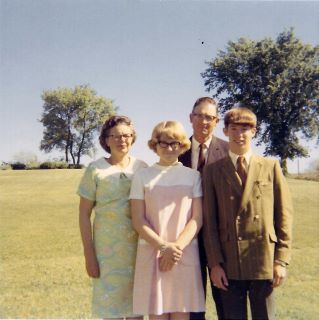
Tent Chapel Church of Christ in Blockton, Iowa, was a small church on the Iowa/Missouri border begun by Joshua Florea, father to ten children. His oldest daughter had a son, Glenn, who later had two boys, Charles and Dean. These brothers became neighboring farmers just north of the Florea-donated land for the Tent Chapel church building and cemetery. Joshua’s daughter, Maude, had a son named, Elvis, who later had a son named David, my dad.
Generations of the Florea family went to church together. Maude (aka Grandma Goff) was known for leading singing from the front row, proudly belting out the hymns to keep everyone in rhythm and on key. This rural farming community of family and neighbors gathered on Sunday mornings for worship, potlucks, and fellowship. They rejoiced when others rejoiced, and they mourned when others mourned.
Fast forward a few decades to 1966… Charles and Dean Cobb, both married by this time, were among those who learned of Elvis’ death and his wife Ruth’s resulting nervous breakdown. Dean and Evelyn, his wife, then watched Elvis and Ruth’s two children, my dad David and aunt Vickie, spend two years in an orphanage. Though they had never had children of their own, Evelyn had been a one-room schoolteacher. Dean knew that extra hands on the farm might be a help and mutual blessing. And so, in 1968, at the ages of 15 and 13 respectively, my dad and Aunt Vickie came to live with their distant cousin, Dean, and his wife of only ten years, Evelyn.
Growing up, my sisters and I were unaware of the full background of the story, and I am only sharing a snippet with you here... We would visit Grammy (dad’s birth mother, Ruth) and take her on day trips from the care facilities where she lived. We would spend a week every summer on the farm with Grandpa (Dean) and Grandma (Evelyn), exploring the barn, riding the four-wheeler, fishing in the pond, making cookies, and enjoying the fresh Iowa corn and other amazing cooking from Grandma’s kitchen.
I can still smell the mixture of tractor grease, dirt, and sweat from giving Grandpa a hug in his worn pair of overalls. Scrabble and baking with Grandma were annual traditions. Her recipe of Jell-o cookies became my own Christmas tradition.

While no formal adoption took place, there was never any doubt in our minds that Grandpa and Grandma were family. Dad had been adopted into their family and therefore, we were automatically born into that extension of their love and support.
Grandpa and Grandma did not pass on their last name. But neither has my dad since he had four daughters. None of them are upset at that lack of named legacy because the more important inheritance is one of faith and love.
Our heritage is part of our identity, but it does not define us. You may or may not know the history of your roots. You may have more questions than pride. Your heritage may be filled with brokenness and destruction instead of loving care.
No matter our history or our heritage, we have been given the beautiful opportunity to join a family of faith, to be adopted by the best Father one could hope to have.
3 Praise be to the God and Father of our Lord Jesus Christ, who has blessed us in the heavenly realms with every spiritual blessing in Christ. 4 For he chose us in him before the creation of the world to be holy and blameless in his sight. In love 5 he predestined us for adoption to sonship through Jesus Christ, in accordance with his pleasure and will— 6 to the praise of his glorious grace, which he has freely given us in the One he loves.(Eph. 1:3-6)
Adoption is an inclusion in family rights and privileges, traditions, and legacies. I share Maude Goff’s boisterous singing and Evelyn Cobb’s love of teaching. I was born into a generational legacy of faith and the Florea history of church planters. But when my dad and aunt were left alone as orphans, no longer directly connected to this legacy and those who could model that faith and its traditions, they were adopted back into that family.
It's like they were bought back or brought back, redeemed. They were given the choice of accepting the offer of a new home and family, of being “adopted.” Which would you choose? It is up to each of us whether we carry on the heritage of living adopted.
My family has been intimately and directly touched by adoption. Twice. We give thanks to God for Grandpa and Grandma, but our greater and eternal thanks are to God for His adoption of us as His sons and daughters.
Have you accepted the gift of adoption and eternal inheritance?
-
Unfaithful Relationships
Co-authored by Claudia Pérez and Edilaine Staton, volunteers with Iron Rose Sister Ministries in Alabama
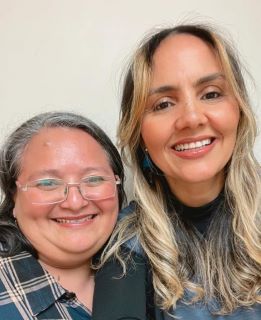
The topic of infidelity in the world today seems to be "fashionable." Every day more public figures exhibit their unfaithful relationships without fear or modesty. It seems that talking about infidelity today is becoming something very "common and normal." And, sadly, infidelities can even be seen in the lives of great religious leaders and within the Church itself. This occurs when behavior outside of what is written in the Scriptures is announced or preached, being faithful to an earthly standard, rather than to the will of God.
Dictionary.com defines infidelity as unfaithfulness; disloyalty. Let us remember what the Bible tells us about infidelity; it reminds us that we have a jealous God who wants us to present ourselves as a pure virgin bride to Christ. “I am jealous for you with a godly jealousy. I promised you to one husband, to Christ, so that I might present you as a pure virgin to him”(2 Cor. 11:2 NIV).
Let's remember the unfaithful relationship between God and the people of Israel. Israel received a warning to not bow down to any other god because Jehovah is Jealous.“Do not worship any other god, for the Lord, whose name is Jealous, is a jealous God” (Ex. 34:14).
Today, the question is: What are the other gods we bow to: the god of money, ego, work, confusion, lust, disbelief, etc.?
God examines hearts. Another example of an unfaithful relationship was the nation of Judah. God’s desire was for Judah to turn to Him with all her heart, but Judah did it halfheartedly. “’In spite of all this, her unfaithful sister Judah did not return to me with all her heart, but only in pretense,’ declares the Lord”(Jer. 3:10).
In the next few verses, we see that God saw Israel as righteous compared to Judah, and gave Israel an opportunity to repent.
The Lord said to me, “Faithless Israel is more righteous than unfaithful Judah. Go, proclaim this message toward the north: Return, faithless Israel,” declares the Lord, “I will frown on you no longer, for I am faithful,” declares the Lord, “I will not be angry forever.”(Jer. 3:11-12)
God has always wanted us to turn to Him with sincere repentance. How many times have we had an unfaithful relationship with our God? How many times have we failed God? How have you shown your faithfulness to God? Like Israel or like Judah? God knows our hearts and will find falsehood. It is my prayer and wish that our repentance be sincere and without pretense like Israel. God forgives us and does not pour out His wrath. He will send people to us who will help us know His heart and who will feed us with knowledge and wisdom. God has given us His Church to welcome and instruct us in His Word so we may remain faithful to Him. “All Scripture is God-breathed and is useful for teaching, rebuking, correcting and training in righteousness” (2 Tim. 3:16).
God tests people’s fidelity. Let's remember how God tested Abraham's faithfulness in Genesis 12:1-2. God was at that moment testing Abraham's trust and faithfulness. God continues to test people as He did with Abraham, however we are not always totally willing to submit to God's will. Today, fidelity to God is increasingly missing from mankind. How many people are suffering due to a lack of faith in God? They do not believe that God even exists and that ultimately leads to their ruin. Many even reach the limit of their strength and take their own lives. The Bible tells us: “Good judgment wins favor, but the way of the unfaithful leads to their destruction”(Prov. 13:15). Infidelity leads us to transgress God's law and walk a hard and rough path.
When we decide to be wholeheartedly faithful to God, we will put aside our egos and walk together on the path that God set for us. As long as we continue to live behind the wall of our desires, we will in no way be able to understand the fidelity that God desires and we will experience an unfaithful relationship with Him. Sinful actions in our lives are evidence of an unfaithful relationship between God and us.
Malachi 3:6 reminds us: “I the Lord do not change. So you, the descendants of Jacob, are not destroyed.” Thus, our infidelity will not alter God's faithfulness, even when we fail in our efforts to be completely faithful to Him. Are you ready to leave any god that is resulting in an unfaithful relationship with the Father? Are you ready to start a faithful relationship with our God and experience His great love and protection?
-
Unity and Alliance in Prayer
Written by Brenda Brizendine, Volunteer Coordinator for Iron Rose Sister Ministries in Colorado

Have you ever felt like you were carrying the entire weight of planet Earth on your shoulders? Or have you felt a very deep sadness? But what makes these feelings even more troubling is that you don't have any idea why.
I remember very well one particular day when I felt this way. I can't describe how real that weight felt. All I wanted to do was cry. I was so overwhelmed by this feeling that I couldn't concentrate on anything.
I wanted to pray and ask God to help me with that weight, but I couldn't complete even a single sentence in prayer, and I didn't know how to ask or what to ask for. But I remember that God directed me to ask for support in prayer from my group of sisters, prayer warriors, who had accompanied me for a long time on my Christian walk.
It was when I shared my request with them, and we agreed to pray for mercy and for God to take away this overwhelming burden, I was released. Through that unity in prayer, even from miles away, the battle was fought for me, and God freed me from the burden that I was carrying.
To this day, I can't find a reason for those feelings, but I am very aware of what I felt when that load was being lifted from my shoulders and my heart was being filled with peace and joy as I read the words of prayer that the sisters shared in our group chat.
Their faith, united in prayer with mine, made something supernatural happen. This reminds me of the passage in Matthew 18:19-20 (NIV)
“Again, truly I tell you that if two of you on earth agree about anything they ask for, it will be done for them by my Father in heaven. For where two or three gather in my name, there am I with them.”
And also, the passage found in James 5:16b, “pray for each other so that you may be healed. The prayer of a righteous person is powerful and effective.”
The enemy tried to defeat me because he found me alone, but when my heart was united with the hearts of my sisters, something powerful happened. The power of the unity of the family of God once again conquered evil with good, sadness with joy, tribulation with peace.
It is important that we develop that community of faith. If you've ever seen the movie "Facing the Giants," there's a scene where a group of people come together to pray for the kids at school. Things began to change. Things started to improve. Powerful things begin to happen when we come together in common agreement, and they are asked in the name of Jesus.
In his novel, This Present Darkness,Frank E. Peretti describes what he imagines our prayers together can do when we are in agreement. It is like clearing the way so that the angels can complete the mission that God has given them.
I currently meet regularly with a group of friends and sisters to pray over our children. Each week we share specific requests, and together, in single-minded agreement, we share these deep desires with the Father. We have seen many of those requests answered. And we are confident that we will continue to see the Hand of God at work in the lives of our little ones. I encourage you today to find your own prayer group, remembering that where two or more are united in the Name that is above all names, there is the power of the Holy Spirit to work miracles.
Allow me to share a prayer with you:
Eternal Father, Great, and Strong You are! I come to you through the Lord Jesus Christ, declaring what Your Word says— that where two or three are gathered together in Your name, there You are in the midst of them. At this moment I come in agreement with my sisters to cry out to You and invoke Your presence. You are Almighty God and for You nothing is impossible. I ask you to take control of our lives and those of our families, keeping us from illness, and supplying us with everything we need in a supernatural way. In the name of Jesus, Father, we humble ourselves and cry out to You for our nations and we ask You to establish Your kingdom. Shower down Your power and glory upon the world, pouring out repentance and conversion on every inhabitant of our countries. Lord, thank You for the power we experience in agreement and help us to maintain unity and keep us from division and strife. In the name of Jesus, Amen!
-
Unlikely Friendships
Written by Deanna Brooks, volunteer with Iron Rose Sister Ministries in Arkansas

Paul and Barnabas teach us that different personalities are able to work together when God is the focus.
Acts 4:36-37 (ESV) introduces us to Barnabas. “Thus Joseph, who was also called by the apostles Barnabas (which means son of encouragement), a Levite, a native of Cyprus, sold a field that belonged to him and brought the money and laid it at the apostles' feet.”
Paul comes on the scene in Acts 7:58-8:1, called by his Jewish name Saul, holding the garments of those stoning Stephen and approving the execution, indicating that he had some authority among Jewish leaders. He was born in Tarsus, an ancient city off the coast of the northern Mediterranean Sea. Philippians 3:5-6 says he was of the tribe of Benjamin, a Hebrew of Hebrews, a Pharisee. He would have considered Jesus a false prophet because of His claim to be the Son of God. He would have believed the new disciples were leaving the true God of Judaism, much like his ancestors did in following Canaanite gods.
Saul grew up in Jerusalem and studied at the school of Gamaliel (Acts 22:3).
Saul went to Damascus with a letter of authority from the high priest of the synagogue, intending to persecute the church there. On the way, he encountered Jesus and was baptized by Ananias. He began preaching in Damascus soon after he was baptized, amazing the disciples who knew he had originally come with the intent to persecute the Christians there (Acts 9:21).
When Saul returned to Jerusalem, the disciples were afraid of him; they remembered him as a persecutor of the church. But Barnabas stood by his side and introduced him to the apostles (Acts 9:26-27). They didn’t trust Saul, but they did trust Barnabas.
The disciples had scattered after the stoning of Stephen. In Acts 11 word reaches Jerusalem that there were believers in Antioch, and Barnabas was sent to investigate. Acts 11:23 tells us, “When he came and saw the grace of God, he was glad, and he exhorted them all to remain faithful to the Lord.”
Barnabas then went to Tarsus to look for Saul, who had been sent there by the disciples in Jerusalem for his safety (Acts 9:30; 11:25-26), and brought him to Antioch where they worked together for a year.
Acts 13:2 reads, “…the Holy Spirit said, ‘Set apart for me Barnabas and Saul for the work to which I have called them.’”
Another missionary disciple, John Mark, went with Saul and Barnabas on this first missionary journey, assisting them as they went from town to town. At Paphos, Mark leaves and returns home.
Acts 13:9 refers to “Saul, who was also called Paul,” and from this point on we read of Paul and Barnabas as they continue without Mark. This journey was filled with receptive hearts as well as persecution from the Jews, who sometimes followed from town to town.
When Paul and Barnabas finished this first journey, they sailed back to Antioch, gathered the church together, and declared all that God had done through them and how He had opened the door of faith for the Gentiles.
Even after all the persecution, Paul and Barnabas began planning a second missionary journey. Barnabas wanted to take Mark again, giving him another opportunity, but Paul opposed taking him and they argued. Acts 15:39 calls it a “sharp disagreement.”
As a result of this disagreement, they went different ways; Barnabas took Mark, Paul took Silas, and the gospel was spread in two directions. Paul completed three missionary journeys. We do not have detail about the further work of Barnabas.
Paul appears to be goal-oriented… he had a purpose, a plan… and he did not want it disrupted. He probably made decisions quickly, then stood by those decisions.
Barnabas appears to be relationship-oriented, looking for those who needed encouragement. He probably took his time making decisions, evaluating what the need was before acting.
Despite the disagreement, it appears Paul kept up with the work of Barnabas and Mark. In 2 Timothy 4:11 Paul wrote, “Luke alone is with me. Get Mark and bring him with you, for he is very useful to me for ministry.”
Paul values Mark, and we assume the disagreement between Paul and Barnabas was not a permanent rift. In Christ-filled relationships, good friends can have sharp disagreements and still maintain respect and friendship.
The confidence Barnabas had in Mark may well have been what encouraged him to write his gospel.
Just as God used Paul and Barnabas despite their differences, He can use our different personalities for His purposes. Paul had intense zeal; Barnabas had a heart for people. We can learn from both of them.
-
Valuing and Celebrating Singleness
Written by Michelle J. Goff, Founder and Director of Iron Rose Sister Ministries
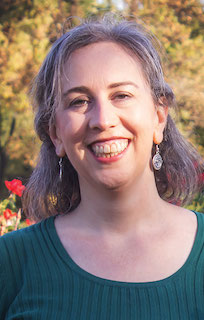
Singleness is a loaded word. It evokes a reaction and carries connotations that stir up feelings we may not be comfortable discussing. For some, singleness is independence and liberty. For others, loneliness, and isolation.
In 2019, I conducted surveys and interviews to ascertain the thoughts of single and single-again women on the topic of singleness. As one of the most neglected populations in our churches, yet statistically over half the population in the U.S., I knew this was a necessary conversation.
Late 2021, One Single Reason: Conversations with Single Women was released. It ensures that we seat God at the head of the table and most attentively listen to His voice. My voice is represented through various stories and illustrations. Other women’s voices are shared through their own experiences and perspectives. Finally, we invite your voice into the conversation. Pull up a chair!
We are invited to share in the opportunity to learn from one another and from Scripture. The number of single and single-again characters in the Bible is astounding. Some of the most famous people whose stories are narrated in the Scriptures were single, starting with Jesus.Then we have Paul, Mary, and Martha amongst His most devoted disciples. Miriam was single, Hagar was a single mom, and Anna was a widow who dedicated years serving in the temple, awaiting the Messiah.
One of the ways we can celebrate singleness is to highlight that facet of these integral individuals in God’s Bible story. Singleness is not the sum of who we are, but neither it is a characteristic or dynamic that can be ignored.
Integrating our unique qualities, God amazingly weaves all our stories into the tapestry of His design and wills us to walk with Him through all stages and ages of our lives. The Body cannot function without all its members (1 Cor. 12); therefore, our single members are also vital to the Kingdom.
One Sunday morning, shortly after the book’s release, a shepherd at my current congregation asked how long it took me to write One Single Reason. Before I could formulate my answer, he interrupted me. “I bet this one took a lifetime.” Amazed at how deeply that elder saw me and my work, I slowly nodded, “Yes, it did.”
Throughout my life, I have heard hundreds, maybe thousands of cries from single women that their stories be heard, and their lives be valued. We are more than our marital status, but singleness brings distinct challenges that can only be understood by someone who has lived through it.
The median age for women to get married has increased to 28 from an average of 20.3 in the 1950s. Most young singles do not have someone in their lives who has lived through the same experiences she has, beginning a career instead of starting a family. One course of action is not right while the other is wrong, they are simply different.
And our differences can feel threatening. We fear what we don’t know or understand. When we openly share our hearts, our struggles, and our experiences, we demystify the unfamiliar. Yes, there is a vulnerability in that level of openness, but we were designed to be in deep and meaningful relationships. Our sincerity will facilitate genuine conversation and unity.
We all long for relationship and purpose (Matt. 22:36-39; Matt. 28:18-20; John 15). As we strive toward these goals, may we listen, learn, and love those who are different. The invitation of God’s love and service in His Kingdom is not exclusive. We can all be clothed with Christ and find our most significant identity in Him (Gal. 3:26-27).
Today, I invite you to ask a single or single-again woman how you can pray for her. It is a first step toward listening, learning, and loving.
-
What I Thought I Understood About God
Written by Corina Diaz, volunteer with Iron Rose Sister in Argentina

From a very young age, my personality was leading towards being an Enneagram 9. If you know about the Enneagram personalities, you will know what I mean. If not, this link will take you to some information that may help you understand it in a very illustrative way: The Nine Enneagram Types - Enneagram Explained.
The ability to mold myself into this Enneagram personality type is a result of being raised by a father who was a very severe man. So, I adopted a rather stressful defense mechanism: trying to make everything perfect at home to prevent my father from getting angry.
As a consequence of maintaining this practice for years, I managed to make connecting with God, from the perspective of seeing Him as a loving Father, one of my greatest challenges. This is especially hard when we have grown up with the image of a God who in the old covenant is seen as a strict and demanding Father, demanding the attention of His people.
However, when we look at the story of God and His people from a more global perspective, we observe a God full of grace and tenderness. “For the Lord your God is a merciful God; he will not abandon or destroy you or forget the covenant with your ancestors, which he confirmed to them by oath”(Deut. 4:31 NIV).
There are examples of grace throughout the Bible. Although the Old Testament focuses its attention on justice, mercy also plays an essential role in our understanding of the character of God. “In love a throne will be established; in faithfulness a man will sit on it— one from the house of David—one who in judging seeks justice and speeds the cause of righteousness”(Is. 16:5).
With God, there is no judgment without mercy. “Yet the Lord longs to be gracious to you; therefore he will rise up to show you compassion. For the Lord is a God of justice. Blessed are all who wait for him!”(Is. 30:18)
This new understanding of the old covenant has also changed the way I perceive my relationship with my earthly father and has even allowed me to discover traits of my own personality that I was unaware of. Now I can feel more authentic in my relationship with myself and with God, I feel confident in a love that doesn't desperately need perfection, it just needs me to be willing to live in His home forever as we are promised in Psalm 23:6. “Surely your goodness and love will follow me all the days of my life, and I will dwell in the house of the Lord forever.”
In this way, Christ can do his work.“My grace is sufficient for you, for my power is made perfect in weakness”(2 Cor. 12:9a).
-
What It Means to Be a Disciple of Christ
Written by Ann Thiede, volunteer with Iron Rose Sister Ministries in Arkansas

“Insecure” describes me from my childhood through my teenage years, wanting to fit in, becoming a people-pleaser which led to conflicts within and ungodly choices. I craved relationships—people with whom I could be close and share my heart. Unfortunately, many of my contemporaries during my high school and college days followed the crowd. But, praise God, a few helped me walk toward Christ.
Matthew, in his gospel, recorded these last words of Jesus:
All authority in heaven and on earth has been given to Me. Therefore, go and make disciples of all nations, baptizing them in the name of the Father and of the Son and of the Holy Spirit, and teaching them to obey everything I have commanded you. And surely, I am with you always, to the very end of the age.
I’m forever grateful for God’s beautiful orchestration through four peers, drawing me to Him and teaching me what it looks like to follow Him. These are some discipleship steps I’ve learned.
The first step involves getting to know Jesus as you read the Gospels with a hungry, teachable heart, and the willingness to let go of preconceived ideas. In searching for what you believe, you will find Who you believe. I encourage you to read through John’s gospel first, taking note of all of the titles Jesus gives Himself. For example, in John 6:35 He says, “I am the bread of life,” and then “…sothe one who feeds on Me will live because of Me” (6:57b). Ask yourself: What would it look like to feed on Christ?
The writer of Hebrews says, “For the word of God is alive and active. Sharper than any double-edged sword, it penetrates even to dividing soul and spirit, joints and marrow; it judges the thoughts and attitudes of the heart” (Heb.
Remember my issue of people-pleasing, wanting approval? Jesus wants us to please Him above all others. His desire is to draw us toward His likeness, giving us the courage to talk as He talked, live and love as He lived and loved, and to reach out and share the Good News even as He did.“For the Son of Man came to seek and to save the lost” (Luke 19:10). It is the heart of Christ that we who are disciples make disciples by sharing His Good News, studying the Word with those who don’t know Him, planting seeds of faith or watering what others have planted, and watching God bring the increase of souls into the Kingdom.
Discipleship means adhering to God’s Word first and foremost. Spirit-inspired words throughout the Bible embody truth. Luke records these insightful thoughts: “Now the Berean Jews were of more noble character than those in Thessalonica, for they received the message with great eagerness and examined the Scriptures every day to see if what Paul said was true” (Acts
Following Christ as His disciple also means walking together in this life with other disciples; encouraging one another, praying with one another, and sharing joy and grief together. Surrendering to Him as Lord and Savior means becoming a part of His Body, the church. Jesus intends for disciples to function together in harmony. I encourage you to read 1 Corinthians 12: 12-31 and Romans 12:4-8, both beautiful passages about the church and what your part may be, according to the gifts God has given you. Many disciples over the years have enriched my life, encouraging me to be more like Jesus. These relationships go deep as we share life including our spiritual struggles and victories. The Holy Spirit has taught me the value of Paul’s admonition when he says, “Follow my example, as I follow the example of Christ” (1 Cor. 11:1). If you desire qualities you see in another person that are Christlike, start asking God!
As you’ve read, in what area of being a disciple of Jesus do you desire growth?
- Getting to know Jesus better through the Gospels
- Developing a consistent prayer life
- Allowing Him to make changes in your life
- Making disciples by sharing Christ with others
- Letting the Word be your guide for truth above all
- Deepening relationships with other disciples
Go to Jesus and share with a fellow disciple. And remember, Jesus has promised to be with you, always.
-
When the Relationship Covenant is Broken
Written by Michelle J. Goff, Founder and Director of Iron Rose Sister Ministries
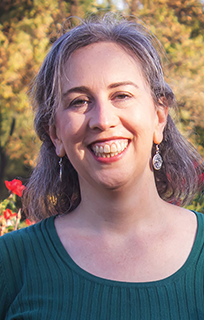
My youngest sister used to decorate beautiful ceramic mugs for me, but she had to stop this practice because I broke every single one. The last one, she rescued before I could break it. I never broke them intentionally. I used them all the time until my clumsiness or a very hard floor caused them to break.
Thankfully, my relationship with my sister was not dependent on the lifespan of those ceramic mugs. After we have gone through a time of brokenness, our commitment to the relationship, the covenant we have made, has actually been strengthened through the brokenness. (See thevideo on Redefined Identity that we narrated together and that illustrates brokenness.)
Still, we cry when things break. Broken relationships are more painful and evoke many more tears than broken dishes.
When my ex called off the wedding and permanently ended our relationship two and a half months before we planned to walk down the aisle, I was devastated. Not only was the relationship broken, I was broken—shattered in a million pieces and disoriented beyond a simple state of confusion. Brokenness was my constant companion for more than three years.
When a relationship covenant is broken, there are a few things that inevitably happen.
- We lose trust in people.
- We lose trust in ourselves.
- We doubt our trust in God.
Single-again women, especially the divorced or separated, I’m sorry for what you are going through and please know that no matter the stage of your healing process, you are not alone! Also, please hear that you are not going crazy! Broken covenants are messy! And they are not what God has designed.
If your spouse broke covenant with you, I grieve with you. Our God can redeem anything and bring about good, even in the midst of the bad (Rom. 8:28).
If you are the one who broke covenant, please know that God’s redemption and forgiveness are possible (Ps. 103:10-13; Eph. 1:7-8).
If the breaking of covenant was necessary for your safety or that of your children, I applaud your bravery and pray that there are others nearby who are able to walk with you and support you in tangible ways (Ps. 103:6; Is. 61:1-3, 7).
Relationships are at the core of who we are and what define us. We learn and teach through relationships—and not all the lessons are positive. Sometimes we are learning what not to do or attempting to teach something we are unfamiliar with because of our past.
Sisters, one thing that I learned is that no matter how much my trust wavers, God’s love for me does not.
Three key lessons I learned through my season of the broken covenant of relationship:
- God is eternally faithful and unconditional in His covenant (Lam. 3:22-26; Heb. 13:20-21).
- God allows people to have free will and I must accept that (Gen. 2:16-17; Rom. 7:15-24).
- Redemption and healing are possible, but they do take time (1 Pet. 2:24; James 5:16).
As I mentioned, a broken promise in relationship is deeply painful and causes us to doubt whether we can trust the other person in the future. My deeper doubts were whether or not I could trust myself to know whether I was a good judge of character, since I chose to be with someone who later broke his promises.
On many levels, I still respected and loved my ex—to the point that when he made his decision clear, I didn’t fight him on it, nor try to convince him otherwise. In his free will, he had chosen to end the relationship. Thankfully for us, it was before we entered into the covenant of marriage. Yet the brokenness I felt was as if he had broken that level of relationship covenant.
In time, I forgave him, but it was not something I could forget. God accompanied me in my grief. He did so through supportive friends, their prayers, then later my own. God was patient with me while I had to sit in the balcony on the furthest row from the pulpit because my pain level was proportionate to my physical proximity during a Sunday morning service.
God loved me through my obedient worship, going through the motions and not yet “feeling it.” God spoke to me through Bible verses that would appear in my social feeds, in conversations, in Bible study, or in prayer.
Over time, God affirmed a quote a friend had shared early on: “Time doesn’t heal all wounds. Time reveals how God can heal all wounds.” Amen!
Part of my healing has been a deeper level of empathy for others who have faced similar pain. The comfort I have received, I have shared with others (2 Cor. 1:3-6).
It is my prayer that God reveal His eternal faithfulness to such a degree that it overshadows any broken covenant of relationship.
Do you believe? Lord, help us overcome our unbelief.
Page 3 of 3

